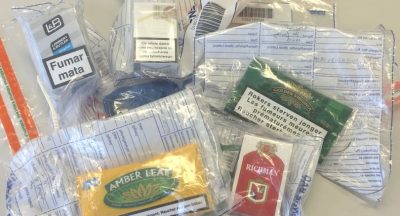Computers with counterfeit software cannot be protected
For every 10 computers in Thailand, eight are running counterfeit software infected with malware, according to Microsoft Southeast Asia. “Many people assume that buying a name brand PC guarantees protection from malicious software. But consumers need to beware that if they cannot verify that the computer they purchased shipped with a genuine copy of Windows software, they are potentially opening themselves up to significant risk,” Vipul Sant, director of Microsoft Asia-Pacific’s Genuine Software Initiative, said last week. The company studied name brand PCs with pirated software installed, as well as counterfeit software DVDs, from five countries in Southeast Asia – Thailand, Indonesia, Malaysia, the Philippines and Vietnam. About 70 per cent of the pirated DVDs and 84 per cent of the hard drives tested in Thailand were infected with malicious software. This is higher than the average malware infection rate of 69 per cent across the region. In 35 per cent of PCs examined from Thailand, the original hard-drive was replaced by a counterfeit hard-disk drive. On average for the region, hard-drive swapping was apparent on 28 per cent of the examined PCs. Vipul said at a press briefing in Bangkok that infected operating systems could seriously harm the performance of a PC and put personal data, such as contact details or bank data, at the risk of being exposed by hackers or criminals. “Customers deserve a name-brand experience, not a computer that crashes or is compromised in some way. This is why Microsoft is committed to educating the retailers, resellers and consumers on the benefits of using genuine software.” With Windows Update disabled, computer systems bypass genuine software checks and are also denied access to critical security updates, leaving them defenceless against malicious cyber-attacks, virus infections and hacking. Microsoft’s testing revealed 1,131 unique strains of malware and virus infections in its Southeast Asia sample including the highly dangerous “Zeus” Trojan. Zeus is a password-stealing trojan known to use “keylogging” and other mechanisms to monitor people’s online activity. Keyloggers record a user’s every keystroke in order to steal personal information, including account usernames and passwords. Criminals use this information to steal victims’ identities and access other private accounts. According to the RSA 2012 Cybercrime Trends Report, Zeus is estimated to have caused over US$1 billion in global losses in the last five years. The 2012 Norton Cybercrime Report shows that the global consumer cost of cybercrime is $100 billion annually, with an average per-victim impact of $197. Ian Guy Gillard, an executive vice president of Bangkok Bank, said using a computer infected with any malware, particularly a Trojan virus, is especially dangerous for online banking users. Hackers can gain full control of the computer and, in some circumstances, may withdraw money from customers’ bank accounts and make online purchases. This can happen on all computer platforms, including PC and mobile platforms. “In order to minimise the risk of being infected, we recommend our customers to take a few safety measures as detailed in our ‘Be SAFE online’ programme, including the use of genuine software only. Customers are responsible for ensuring the safety of the computers they use to access our services. That is why we support Microsoft in their positive outreach to educate consumers and businesses about the importance of using genuine software only,” he said. Chainarong Charoenchainao, deputy commander of the Economic Crime Division, said the division is in line with the National Police’s continuous actions to crack down on the use and sale of illegal software. Cybercriminals use malware for a range of invasive activities generating illegal profit from stealing consumers’ banking and credit card information to spamming their email and social media contacts with fraudulent requests for charitable donations or bogus offers such as for counterfeit prescription drugs. For businesses, the risks associated with using malware-infected, pirated software include low IT productivity, critical system failures and disruptions of service, and theft of confidential company data leading to severe financial loss and reputational harm.
http://www.nationmultimedia.com/technology/Computers-with-counterfeit-software-cannot-be-prot-30201264.html
Related Posts
Mumbai airport customs destroys 3700 kgs of confiscated cigarettes
As part of an ongoing special initiative to free up office space, Mumbai...
Luxury fakes litter online portals
Shoppers looking to snag a luxury timepiece may be tempted by the allure of...
Illegal tobacco on Merseyside: Buying cheap cigarettes is not a victimless crime
Tobacco smugglers are putting legitimate shops - and their workers - at risk by...
No ‘restricted areas’ in combating smuggling: Deputy PM
Deputy Prime Minister Nguyen Xuan Phuc stressed that there are no ‘restricted...




